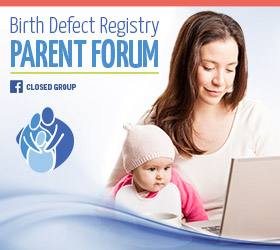How to Get Services for Your Child
If your child has been born with a birth defect or another disabling condition, you are not alone. There are many public and private services available to assist you in your community. All you need to do is find out how to access those services for your child.
Social Services: Your search for help can start at the hospital where your child was born. The hospital’s medical social worker can direct you to many resources that are available in your community. If the hospital does not offer this kind of service, you should call your state or local department of mental health. These agencies may also be able to assign a social worker to help your family.
Early Intervention Services: Every state has a program to identify children with handicapping conditions prior to the age of two. These early childhood outreach programs can be reached through the health department or the department of education in your community. Early intervention programs will assess your child’s need for physical therapy, speech and/or occupational therapy and provide these services for free if a need is identified.
Support and Self-Help Groups: Joining a parents’ support group can be one of the best ways to help your child and your family cope with the challenges ahead. Support groups work together to:
- Share information and experiences about their children’s conditions and available services
- Increase public awareness and understanding of the disability
- Help support research and training projects
- Advocate as a group for services
- Build new friendships with others who really understand how you feel
You can find a support or self-help group by looking for listings of local, regional, or national organizations in the yellow pages of your local phone book or in association directories in your public library. If you have internet access you can find support organizations and chat groups for different birth defects listed in the Family Support area at www.birthdefects.org.
Start a Support Group: There are many conditions that do not have support groups yet. You could help yourself and other families by starting a support group for your child’s disability. If you have participated in Birth Defect Research for Children’s Parent Matching project, you could start a support group with your list of parent matches. Families do not have to live in the same community to become part of a support group. Many groups network by mail, phone, e-mail and video tape exchange.
Medical Services: If your child has a rare or complicated medical condition, you may want to research alternatives for medical care and treatment. Your public library or nearby university library may be able to run a computer search of the medical literature for you. (There may be a charge for search time). This computer search will list the titles, authors, and publications with the latest information about your child’s condition. You can order copies of these articles through your library’s Inter-Library loan department. If you have access to a computer that is connected to the internet, you can do your own research through links to the National Library of Medicine, On-Line Mendelian Inheritance in Man, and other research resources. There is also a research firm, the Health Resource, which can prepare a comprehensive report on your child’s condition and possible treatment options.
What you should ask about services for your child
- What are the eligibility guidelines (including extent of disability and financial requirements)?
- Will information about my child’s condition be confidential?
- Will my family have access to all information about my child?
- Will I have informed consent and participation in all decisions affecting my child?
- Can I file a grievance if I have a problem with a service provided to my child?
- Do I have the right to appeal any decisions about my child’s care or treatment?
- Are there written rules or standards that serve as guidelines for how services will be provided?
Planning ahead
When you are assessing multiple services for your child, you can help avoid problems and misunderstandings by following a few simple steps:
- Always keep a written record of all meetings and conferences about your child. Include the date, names and titles of all meeting participants and a summary of the discussion. Send a copy of these notes to those involved so they can comment at that time if they do not agree with what you have recorded.
- Keep copies of all consent forms, questionnaires or other forms you fill out regarding your child.
- Take a tape recorder to all meetings and conferences about your child.
- If possible, bring another family member, friend or advocate with you to all meetings and/or conferences.
Fact Sheet by:
Birth Defect Research Children, Inc.
www.birthdefects.org







